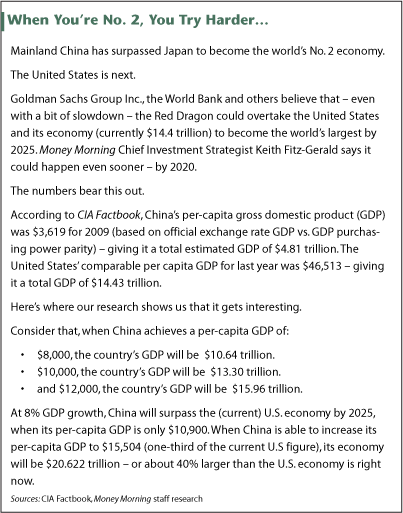As the old Avis rental car slogan used to say: "When you're No. 2, you try harder."
With the growth rates that its economy has turned in the past few years, no economist could ever accuse China's leader of not trying hard. China now claims to have jumped over Japan to take over the No. 2 spot in the world economic pecking order.
China's next target: The No. 1 U.S. economy.
In fact, some experts believe that China could catch up to the United States' $14.4 trillion economy in as little as 10 to 15 years.
"The stark, inescapable reality for those who would dismiss China is that China's growth is not only very real, but has the greatest upside potential in recorded history," says Money Morning Chief Investment Strategist Keith Fitz-Gerald, who predicted this scenario several years ago.
Yi Gang, the country's chief currency regulator and director of the State Administration on Foreign Exchange, said that China has achieved the No. 2 spot during an interview in China Reform magazine. China came close to surpassing Japan in 2009 and has continued its torrid economic growth ever since.
China's $4.81 trillion economy grew by 11.9% in this year's first quarter and 10.3% the second, with gross domestic product (GDP) expected to grow at a better-than 9% clip in the second half. China's annual growth since its market reforms of 1978 has averaged more than 9.5%.
Yi said that although the country will not be able to keep up a robust growth rate of 9% - 10% each decade, if China can maintain a rate of at least 5% - 6% through the 2020s, it would reach 50 straight years of rapid growth - what he calls "unprecedented in human history." Its current 30-year climb has helped it surpass the economies of Britain and France in 2005 and Germany in 2007.
Money Morning's Fitz-Gerald predicted that China would overtake Japan two years after passing Germany.
Where China still lags behind its closest economic competition is in the area of per-capita income. With a World Bank ranking of 124, China comes in at $3,800 a year, which is a far cry from Japan, which is ranked No. 32 at $37,870, and the United States, ranked No. 17 at $46,513.
By maintaining an average annual GDP growth rate of 8%, China could overtake the U.S. economy by 2025 - with a per capita GDP that's less than one-third the comparable U.S. number.
Money Morning's Fitz-Gerald actually sees China snagging the top spot even earlier - maybe as soon as 2020 - less than 10 years from now.
"There's no doubt there's going to be ups and downs, and there's going to be bubbles and growth spurts, just like we've experienced in our own economies, but data like this suggests that it's just par for the course," Fitz-Gerald said.

Fitz-Gerald cites China's poor water quality and immature financial markets as the only impediments to its growth, but having a limited variety of financial instruments has also been a positive factor for China.
"It means China has not engaged in the nonsense that drove the rest of the world to financial oblivion," said Fitz-Gerald.
Skeptics who think China's communist environment will impede its financial strength simply aren't looking at all the facts, Fitz-Gerald.
"Where is it written that you have to be democratic to be capitalist - except in our own book? The China of the future is likely to include a blend of capitalism, communism and democratic principles that are in their infancy today," said Fitz-Gerald.
Although China has gained political clout with its increasingly powerful financial position, Yi said that the country's No. 2 spot did not mean it was eager to make the yuan a global currency soon.
"China is still a developing country, and we should be wise enough to know ourselves," Yi said. "We must be modest and we still have to keep a low profile. If other people choose the yuan as a reserve currency, we won't stop that as it is the demand of the market. However, we will not push hard to promote it."
China's increased ranking gives yet another reason for investors to ensure they are part of a market offering historic profit opportunities. Fitz-Gerald continues to reiterate his urging for investors to double their exposure to China.
Said Fitz-Gerald: "The dragon is coming to lunch. The only decision investors have to make is whether you will be at the table or on the menu."
News and Related Story Links:
- The Wall Street Journal:
China Central Banker Says Growth to Slow Long Term
- Money Morning:
Money Morning Mid-Year Forecast: Why China's Economy Will Exceed Expectations in the Second Half of 2010
- SellSellblogspot.com:
Advertising No. 2 Greatness: Avis.


